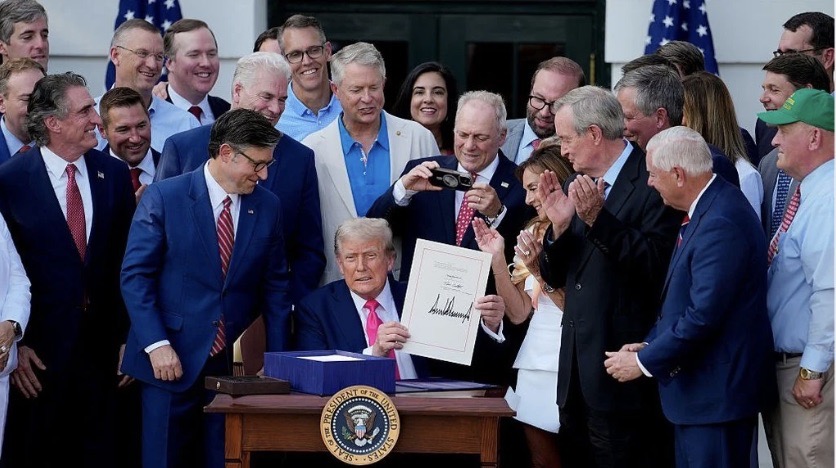Trump Signs Sweeping “One Big Beautiful Bill” into Law – Historic Tax Cuts and Spending Shifts Unleashed

U.S. President Donald Trump has signed into law a landmark 940-page bill dubbed the “One Big Beautiful Bill”, introducing the largest tax cuts in modern American history, sweeping reductions in federal social programs, and a significant increase in military and border security spending. The legislation also raises the U.S. national debt ceiling by $5 trillion,
as G.Business reports, citing Reuters.
The signing ceremony took place on the South Lawn of the White House on July 4, Independence Day, where Trump called it “the single biggest and most beautiful piece of legislation ever passed.”
“Nothing like this has ever happened before,” Trump stated. “This is a victory for the American people.”
Key Provisions of the Law
The bill, passed earlier this week by both chambers of Congress, reshapes core aspects of U.S. federal policy across four major areas:
1. Taxes
- Permanent tax cuts for corporations and families.
- Elimination of federal taxes on tips and overtime pay.
- New tax credits for U.S.-based manufacturers, particularly in the auto sector.
2. Social Spending Cuts
- Reduced funding for Medicaid, SNAP (food assistance), and other welfare programs.
- According to the Congressional Budget Office (CBO), more than 12 million Americans could lose health insurance by 2034 due to these rollbacks.
3. Defense and Border Security
- $170 billion in additional funding for border security, including expanded detention facilities and digital surveillance systems.
- $160 billion allocated to the Department of Defense, with significant investment in a new missile defense initiative known as “Golden Dome”.
4. National Debt and Fiscal Forecast
- Raises the debt ceiling by $5 trillion.
- The budget deficit is projected to grow by $3.3 trillion over the next 10 years.
Elon Musk’s Resignation and Criticism
The law also sparked political fallout. Elon Musk, former head of the government efficiency task force (DOGE), resigned from his advisory post in May 2025 over the bill.
Musk, once a strong proponent of tech-led reform in government, sharply criticized the legislation as “economically destructive,” stating that it "burdens future generations and undermines American competitiveness.” He warned that the bill rewards short-term political gain at the expense of long-term innovation and productivity.
Reactions and Legal Challenges
The bill passed narrowly in the Senate on July 1, followed by a House vote on July 3 after hours of heated debate. The vote split largely along party lines, with most Republicans in support and Democrats in opposition.
Civil rights organizations such as the National Health Coalition have announced plans to challenge the law in federal court, focusing on the Medicaid and SNAP reductions. Legal scholars have also raised constitutional concerns about the elimination of federal taxes on labor-based earnings like tips.
Economic Outlook
Analysts anticipate short-term economic boosts in sectors such as automotive manufacturing, defense, and security technology. However, economists also warn of long-term fiscal pressure and increased inequality, particularly among low-income households.
The legislation marks a clear ideological shift in U.S. governance: toward deregulation, reduced welfare, and expansive state power in defense and immigration. Whether the law brings sustainable growth or deepens division will remain a central question heading into the 2026 midterm elections.
Stay informed with stories that matter — here’s an insightful read on how Wang Ning built a $22.7 billion toy empire with a fluffy monster called Labubu.
Foto - Getty Images/Kent Nishimura